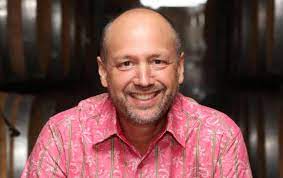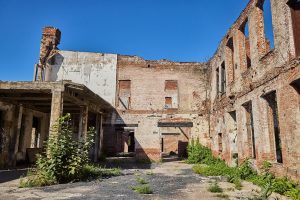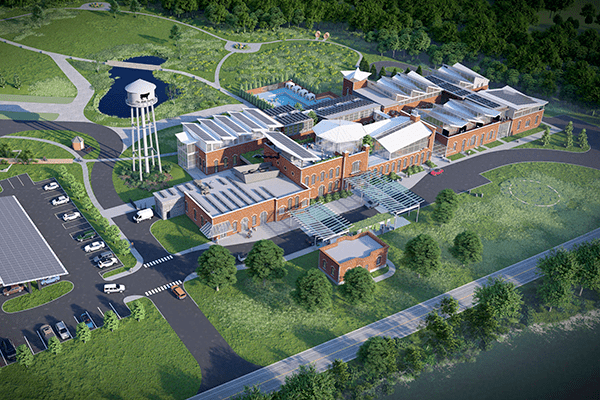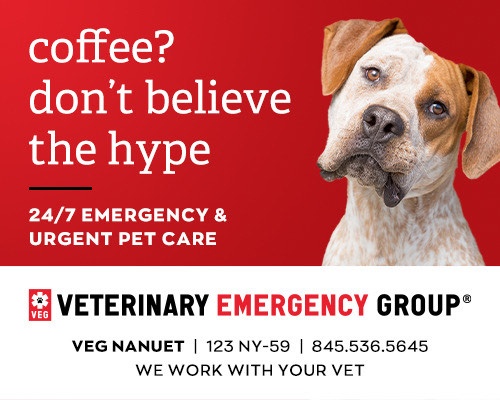|
RCBJ-Audible (Listen For Free)
|
Orange County Plan Led By Michael Dorf Is An Adaptive Re-Use Aimed at Attracting Tourists To Upstate Hotel, Restaurant, Winery & More
By Tina Traster
Music impresario and the titan behind City Winery is slogging through the bureaucratic quicksand needed to greenlight plans to rehabilitate a former milk factory and give it new life as a boutique hotel and hospitality magnet on the Orange-Ulster counties border. Though the approvals process is slow and frustrating, the Hudson Valley developer is betting his adaptive re-use project will have a long shelf-life.
“The process has been slow,” said Michael Dorf, who purchased the ghostly remains of the former Borden milk factory at 2860 Route 208 in Walden two years ago for $575,000 under a limited liability company, CWMD LLC. “We don’t have full approvals from the town [of Montgomery], but we’re very, very close.”
He’s hopeful – and as he says, “never more excited” about a project.
The Milk Factory, as it will be called, is a passion project for Dorf, 60. He is planning to maintain the existing footprint of the former factory and use original brick to construct a two-story building that will house a restaurant, spa, gym, winery, gallery, event venue, and co-working space on the ground floor, and a 50-room boutique hotel on the second story. A key asset to the planned proposal is its proximity to the adjacent Walden-Wallkill Rail Trail, which will be connected by a spur to the hotel.
The 50,000 square-foot footprint will increase to 85,000 square feet with a second floor on the 22-acre site. Dorf says nearly most of the site will remain “as natural as possible.”
Over the past two years, the vision – and the price tag – has changed considerably from projections with fewer rooms and half the cost. With today’s inflationary pressure, coupled with rising construction costs, the project is now estimated at $35 million.

Dorf, a Wisconsin native legendary for founding the iconic Manhattan music venue The Knitting Factory at age 23 in 1986, has over the past four decades built a hospitality empire with his City Winery franchise. His first foray into adaptive re-use of an historic building in the Hudson Valley came to fruition in 2018 when he opened a City Winery at the former Montgomery Worsted Mill, just seven miles from the proposed Milk Factory site.
Repurposing an historic building is generally more expensive than constructing from the ground-up, but it imbues a project with meaning and stewardship. That’s the challenge and privilege Dorf is embracing, though he has learned there are additional hurdles. For example, even though the structure is not listed on the New York State Historic Register, the project needed approvals from New York State Historic Preservation Office.
Dorf is awaiting what he hopes will be a “negative” declaration of SEQRA (State Environmental Quality Review Act) from the Town of Montgomery. A negative declaration would enable the project to move forward without extensive additional environmental review.
 The historic landmark, which was mostly destroyed in a fire 30 years ago, overlooks the Wallkill River, and is nestled near the border with Ulster County and the Town of Shawangunk. The Borden company was the first plant to make condensed milk.
The historic landmark, which was mostly destroyed in a fire 30 years ago, overlooks the Wallkill River, and is nestled near the border with Ulster County and the Town of Shawangunk. The Borden company was the first plant to make condensed milk.
“I’ve been riding my bike past this dilapidated building for 25 years,” said Dorf. “I’m so excited to take custodianship of this piece of history and bring it back to life.”
Schooled in food and beverage, Dorf says the restaurant, to be named Moo, will be run in-house. He plans to include a gin and whiskey distillery in the hotel, a new frontier in the developer’s wheelhouse.
The plans call for The Milk Factory to be a Net Zero property, relying on solar power to achieve sustainability.
But his newest venture, if successful, will add “hotelier” to his credentials – and for that aspect of the project he is seeking an operator.
“I’ve always done stuff myself,” said Dorf. “But on this project, we are seeking a hotel operator and there is a lot of interest.”
Hudson Valley Hotels Sprouting Like Wildflowers
Dorf is heartened by the successful debut of Wildflower Farms by the Auberge Resorts Collection, an international hotel operator, in nearby Gardiner. Able to fetch upward of $1,100 per night, the tony hotel has created a lot of buzz and given other hotel groups license to charge a pretty penny for lodging and amenities, for now. Dorf says The Milk Factory will be a luxury property but more accessible at an average nightly room rate of $500.
There has been a rash of new hotels in Orange, Ulster, and Sullivan counties over the past several years – everything from rehabilitated boarding houses to boutique hotel properties in Kingston to planned redevelopment of former Catskill hotels like The Nevele and Villa Roma. Dorf is betting on tapping into the fervor and excitement that’s been building around the proliferation and variety of hotel properties and pent-up curiosity and demand for leisure in the Hudson Valley. Some properties thrive as resort destinations while others take advantage of the synergy between cool and hip Hudson Valley towns. Keith Rubenstein, the developer who plans to turn the former Nevele into a hotel/housing destination, hopes his project will breathe new life into Ellenville, which is trying very diligently to gentrify.
Dorf envisions The Milk Factory as a destination-oriented property, where folks come for the food, wine, amenities, and nature. Hiking, biking, climbing, and kayaking are accessible around the site. Nearby towns like Wallkill and Walden are not “cute town” assets for the project like Kingston, New Paltz, Saugerties, Woodstock, for example.
The developer says he’s received roughly $6 million in a PILOT (payment in lieu of taxes) commitment through the Montgomery Industrial Development Agency and via Empire State Development Grants. There are plans to hire between 75 and 100 people.
Dorf lightens up when he talks about some punny ideas for the project, including calling the art gallery “MooMa,” an homage to the MOMA, and naming a walkway that will be created between the building and the bike path the Milky Way.
The Milk Factory is a project to watch because of its pedigree, the complexities of adaptive re-use, and the impact of having another boutique hotel in the mix.
For Dorf, the Milk Factory is personal – a legacy project.
“This needs to be profitable but I don’t need to make money,” he said wistfully. “I’m doing this because I love the integrity of the building. I love living up here. I feel a deep connection. I want to create a place to gather, to bring joy. That’s what gets me going.”














